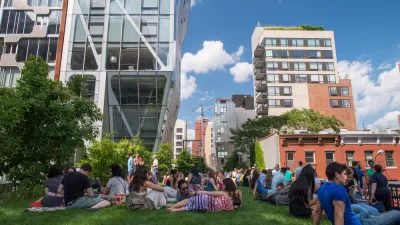Richard Florida reports on why America ranks second to last among first world nations for economic mobility; the Northeast remains the most mobile region of the country.
The American mythology is founded on the idea that the poor, the hungry, and the destitute have the opportunity to rise above one's inherited circumstances and create a new destiny and prosperity from the sheer sweat of one's brow. Despite the persistence of this notion in society, America has become one of the least economically mobile countries in the world. It ranks below Canada, the majority of Europe, Singapore, and Pakistan. In Richard Florida's piece from The Atlantic Cities, he cites information from the New Republic and recent studies from the University of Ottawa, Federal Reserve Bank of Chicago, and the Brookings Institution that all conclude the United States is becoming increasingly connected with income heritability.
When the United States is broken into regional demographics, positive correlations exist between economic mobility and education spending per student, high school and college graduation rates, diversity, higher incomes, and a creative class. States with higher graduation rates, more immigrants, and openness to creativity and difference boasted the greatest economic mobility. Conversely, there is a negative correlation between religion, divorce, and teen pregnancy. States which ranked high in these categories had a low index of economic mobility.
The map is representative of divides between "red" and "blue" states. Although much has been made of the growing income gap and culture gap between these two groups, there is relatively little attention paid to the policy differences between states which foster these exceedingly disparate environments and opportunities between regions. The southern states have empirically trailed behind the Northeast as the economic driver of the nation. In an election year, perhaps it's time to start addressing the causes of this gap instead of declaring a color war.
Thanks to Elaine Mahoney
FULL STORY: Why Some States Are More Economically Mobile Than Others

Planetizen Federal Action Tracker
A weekly monitor of how Trump’s orders and actions are impacting planners and planning in America.

Maui's Vacation Rental Debate Turns Ugly
Verbal attacks, misinformation campaigns and fistfights plague a high-stakes debate to convert thousands of vacation rentals into long-term housing.

Restaurant Patios Were a Pandemic Win — Why Were They so Hard to Keep?
Social distancing requirements and changes in travel patterns prompted cities to pilot new uses for street and sidewalk space. Then it got complicated.

Charlottesville Temporarily Has No Zoning Code
A judge ordered the Virginia city to throw out its newly revised zoning code, leaving permitting for new development in legal limbo.

In California Battle of Housing vs. Environment, Housing Just Won
A new state law significantly limits the power of CEQA, an environmental review law that served as a powerful tool for blocking new development.

Boulder Eliminates Parking Minimums Citywide
Officials estimate the cost of building a single underground parking space at up to $100,000.
Urban Design for Planners 1: Software Tools
This six-course series explores essential urban design concepts using open source software and equips planners with the tools they need to participate fully in the urban design process.
Planning for Universal Design
Learn the tools for implementing Universal Design in planning regulations.
Heyer Gruel & Associates PA
JM Goldson LLC
Custer County Colorado
City of Camden Redevelopment Agency
City of Astoria
Transportation Research & Education Center (TREC) at Portland State University
Jefferson Parish Government
Camden Redevelopment Agency
City of Claremont




























